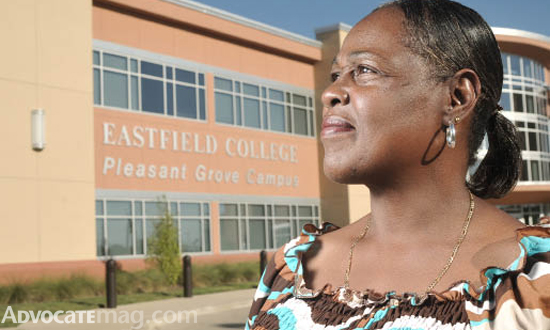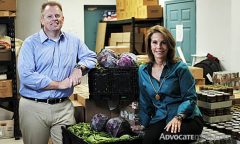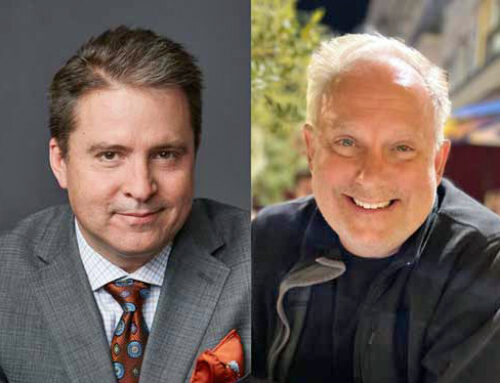The nonprofit helps people pull themselves out of poverty
[youtube]http://www.youtube.com/watch?v=4ZoSKJw6Bt8[/youtube]Pearnetta Perry of East Dallas flashes the student ID badge hanging from the lanyard around her neck.
“I’m a college student at Eastfield College,” she says with a grin.
For the first time in her life, the 51-year-old is learning to read and do math problems, and she will sit for her GED in November. She’s doing it with the help of a neighborhood-based nonprofit, the Wilkinson Center, which marks its 30th anniversary next year.
Perry says she didn’t attend school as a child. One of 12 children, she moved to Texas from California when she was 7, and her mother fell ill, leaving Perry to care for the younger ones.
“I had to sew, cook, iron, walk them to school, pick them up from school, feed them, get lunch and dinner ready, and see about mother,” she says.

Pearnetta Perry of East Dallas came to Wilkinson Center looking for groceries, and she received so much more. Photos by Can Türkyilmaz
She learned to clean and cook and care for others, often working two or three jobs while raising her siblings and her own son and stepchildren. But she never learned to read. She could count, but she never learned to add and subtract.
She had a good job as a nurse’s aid until two years ago, when ownership of her company changed hands. The new owners asked her to resign, she says, when they realized she didn’t have a GED. That’s how she wound up at the Wilkinson Center’s food pantry, asking for a handout for the first time in her life.
While she was there, she noticed an announcement on a monitor. She couldn’t read it, but she recognized those important letters: GED. So she asked Wilkinson Center case manager Miguel Brambila to read it to her. Later that week, she enrolled in the pre-GED program at Eastfield College’s Pleasant Grove campus, where the Wilkinson Center occupies a wing. The neighborhood nonprofit uses the space to offer computer and GED classes, financial literacy and ESL.
“The purpose is to get them college-ready,” says education coordinator Brandy Freeman. “A lot of them test below a ninth-grade level.”
Wilkinson Center opened after Rev. Clayton Lewis of the former Munger Place United Methodist Church saw a child rooting through garbage for something to eat.
Since then, Wilkinson Center has grown into an organization that helps individuals and families pull themselves out of poverty. The center serves about 40,000 people a year with emergency food and shelter, counseling, after-school programs and adult education.
Many out-of-work people in our neighborhood wind up at the Wilkinson Center food pantry, where they can take home food when grocery money has run out.
But some, like Perry, receive more than just peanut butter and sympathy.
Reading is still difficult for Perry. English is tricky, what with two, too and to, and the like. She’s working on it. Math, however, is a different story.
“I’m hell on those fractions,” she says. “I can work a fraction.”
Perry’s goal is to become a social worker like her 34-year-old son, Whusheane Perry, who lives in Glendale, Ariz.
Starting around age 7, Whusheane had to sort through his mother’s mail to tell her which was junk and which were bills.
“He said, ‘Mom, can’t you read?’ ” Perry recalls with a tremble in her voice. “I said, ‘Huh-uh.’ ”
Whusheane Perry, who holds a master’s degree in social work, bought his mom a laptop this past Mother’s Day, and she uses it for online math and reading drills. When Perry talks of graduation, she always mentions her son. He will be so proud of her, she says.
Perry still works part-time and seasonal jobs — she has worked at the State Fair of Texas for 29 straight years — as long as the jobs don’t interfere with her schoolwork. It’s an adjustment, she says, because working has always been part of her identity.
“Now I say, ‘To hell with a job,’ because I want my education,” she says. “If I get a job today, and I lose it, I’ll be in the same spot I was in before. God wants us to go for things we never had. I’ve always worked. That’s all I knew how to do, was work. But I’ve never had this.”






